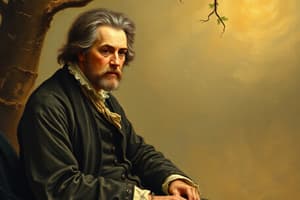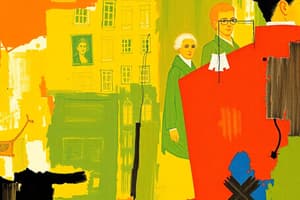Podcast
Questions and Answers
In which year was Rousseau born?
In which year was Rousseau born?
- 1712 (correct)
- 1722
- 1732
- 1702
What was Rousseau's occupation before becoming a philosopher?
What was Rousseau's occupation before becoming a philosopher?
- Professor at the University of Paris
- Philosopher immediately
- Saddler like his father
- Tutor to sons of noblemen (correct)
What is the title of Rousseau's influential work on developmental psychology?
What is the title of Rousseau's influential work on developmental psychology?
- On Education
- Emile' (correct)
- The Social Contract
- Discourse on Inequality
Why was Rousseau's work 'Emile'' criticized by the Paris Theology Faculty?
Why was Rousseau's work 'Emile'' criticized by the Paris Theology Faculty?
According to Rousseau, what should education direct children towards?
According to Rousseau, what should education direct children towards?
What is Rousseau's view on human nature?
What is Rousseau's view on human nature?
In 'Emile'', how is the child educated?
In 'Emile'', how is the child educated?
What impact did 'Emile'' have on the focus of education?
What impact did 'Emile'' have on the focus of education?
What did Rousseau believe was the best teacher?
What did Rousseau believe was the best teacher?
Why did Rousseau think women's education should be relative to men?
Why did Rousseau think women's education should be relative to men?
What bodily training did Rousseau think women should receive?
What bodily training did Rousseau think women should receive?
What skills did Rousseau think women should be taught?
What skills did Rousseau think women should be taught?
What trait did Rousseau think women should be taught?
What trait did Rousseau think women should be taught?
Where did Rousseau discuss women's education in his work?
Where did Rousseau discuss women's education in his work?
What is the most fundamental meaning of nature according to Rousseau?
What is the most fundamental meaning of nature according to Rousseau?
What should education be guided by, according to Rousseau?
What should education be guided by, according to Rousseau?
What does Rousseau mean by 'natural person'?
What does Rousseau mean by 'natural person'?
What should be the basis of human action, according to Rousseau?
What should be the basis of human action, according to Rousseau?
What kind of habits should a child be allowed to develop, according to Rousseau?
What kind of habits should a child be allowed to develop, according to Rousseau?
What kind of environment should education be imparted in, according to Rousseau?
What kind of environment should education be imparted in, according to Rousseau?
What is the relationship between nature and society, according to Rousseau?
What is the relationship between nature and society, according to Rousseau?
What should be discovered through investigation, according to Rousseau?
What should be discovered through investigation, according to Rousseau?
Flashcards are hidden until you start studying
Study Notes
Rousseau: Introduction
- Rousseau was born in Geneva in 1712 and died in 1778.
- He came from a middle-class family, and his father was a saddler.
- Despite receiving little formal education, he was a self-taught genius of the Age of Enlightenment.
- He tutored sons of noblemen and wrote the influential work "Emile", which brought him fame but also led to his banishment by the Paris Theology Faculty.
Rousseau: Philosophy
- Rousseau believed in living in harmony with nature and that education should direct children towards goodness.
- He emphasized the importance of focusing on the nature of the child in the educational process.
- According to Rousseau, children should be treated as children and not educated like grown-ups.
Rousseau: Emile'
- "Emile'" is a fictitious account of an educational experiment on a young child, describing education suitable for Rousseau's ideal society.
- The work made a significant contribution to shifting the focus from teacher to student.
- "Emile'" promoted a feeling for childhood, which eventually led to the concept of the nuclear family.
- Rousseau opposed the overindulgence of children by parents, which he believed hindered their development.
Rousseau's Threefold Meaning of Nature
- The first and fundamental meaning of nature is the social one, which emphasizes the importance of understanding the true nature of the person.
- Education must be guided by the laws of children's own nature, and society must bow down to it.
- A natural person is not a savage one, and when interacting with others, their nature is influenced by nurture.
Psychological Significance
- Nature is defined as instinctive judgments, primitive emotions, and natural instincts of humans.
- Human actions should be based on these instincts, emotions, and judgments.
- To understand these, one must delve into the psychology behind them.
- Psychological nature is more significant than social interactions.
Development of Habits
- A child should not develop habits born of social interactions, but rather adhere to instinct and emotions.
- The only habit a child should be allowed to develop is 'no habit whatsoever'.
Phenomenal or Physical Significance
- Education should be imparted in natural surroundings for a fuller and deeper impact on students.
- Rousseau believed that nature is the best teacher, and cities are the graves of civilizations.
Rousseau's Views on Women Education
- Rousseau discusses women's education at the end of Emile'.
- He believes that the man that Emile' has become after being educated needs an educated wife.
- Education for women should be relative to men, aiming to please them and be useful to them.
- Women should be given adequate bodily training for physical charm and producing vigorous offspring.
- They should be taught domestic skills, obedience, and industriousness, as well as singing, dancing, and other traits.
Studying That Suits You
Use AI to generate personalized quizzes and flashcards to suit your learning preferences.




